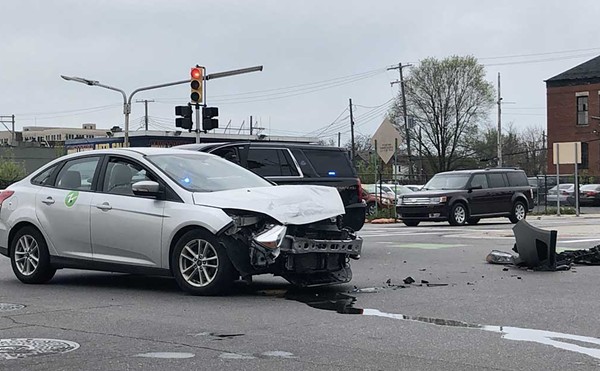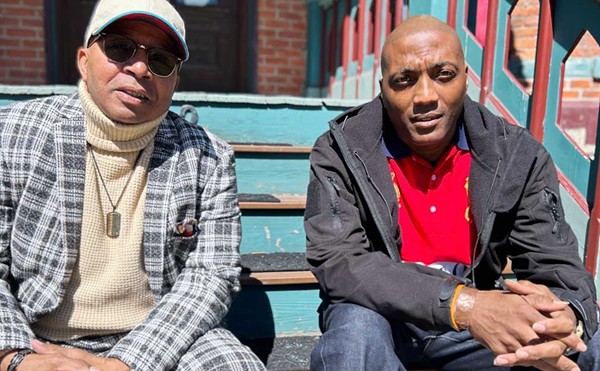News Hits will be the first to admit that Diane Bukowski isn't a conventional mainstream journalist. She is, after all, a freelancer for The Michigan Citizen, a publication that bills itself as "America's most progressive community newspaper."
Whatever you may think about Bukowski's skills as a journalist, however, there's no question that she's tenacious. As we pointed out before, she was the first in town to draw attention to the problem of Detroit police officers being involved in far too many questionable shootings. Eventually, after other media followed her lead and began exposing the situation, a U.S. Justice Department investigation concluded in 2003 that the department was, along with other severe shortcomings, "subjecting individuals to uses of excessive force. …" As a result, the DPD remains under federal oversight.
Which brings us to the issue of Bukowski's felony conviction earlier this year, and her ongoing attempt to win a new trial.
In November 2008, Bukowski was arrested for allegedly crossing a police barrier to take pictures at the scene of a fatal accident on Detroit's west side. The accident involved a motorcyclist fleeing the Michigan State Police, who were engaged in a high-speed pursuit. The motorcyclist struck a pedestrian, and both were killed.
Bukowski, who has questioned why the cops weren't using their siren while making a high-speed chase past a school, showed up and began taking photos. The cops, who were dealing with an unruly crowd, quickly slapped cuffs on her and took her away in a squad car.
Before doing so, however, one of the state troopers confiscated her camera and deleted some of the photos. Bukowski was charged and convicted of two felony counts of resisting and/or obstructing police earlier this year and put on probation for one year, fined $4,000 and ordered to perform 200 hours of community service.
Although the judge handling the case, Michael Hathaway, has said several times from the bench that the state trooper illegally destroyed evidence, Prosecutor Kym Worthy's office has never brought charges against him. Assistant Prosecutor Thomas Trzcinski defended the cop's action, saying it was done to keep the crowd from getting out of control.
That seems a patently ridiculous rationale, since there's no way people in the crowd could see images on the camera or know that they were being erased. Why single out Bukowski?
A local Fox 2 news crew filmed Bukowski's arrest; the tape, which we watched being played in court, shows no sign of Bukowski offering any type of resistance.
News Hits firmly believes that, at best, Bukowski was overcharged; what she did in no way should have been considered a felony offense.
The jury, however, disagreed. They were prohibited, however, from taking into account the fact that Bukowski was acting as a reporter. Bukowski contends that she was offered a plea deal that would have reduced the charges to a misdemeanor offense in return for admitting guilt, but she refused, continuing to claim that she did nothing wrong.
Bukowski was in court last week — before Hathaway again — with a pair of new lawyers, John Royal and Sharon McPhail, who were seeking a new trial for their 60-year-old client.
Much of their argument for a new trial is based on the claim that Bukowski wasn't effectively represented during her first trial. Because of a conflict with her original lawyer, Bukowski obtained a new attorney just 10 days before she was set to go to trial. A request by that new attorney, Emmett Greenwood, to delay the proceedings so that he could become better acquainted with the case file, was denied by Hathaway.
Hathaway, in last week's hearing, turned down nearly all the reasons posted by Bukowski's lawyers arguing for a new trial. For example, the defense argued that during the preliminary exam conducted by Judge Beverly Hayes-Sipes, it was ruled that Bukowski should not be prosecuted for merely breaching the crime scene barrier. However, the prosecution was allowed at trial to make that issue a central part of the case against Bukowski.
Hathaway said last week that he was not obligated to abide by Hayes-Sipes' preliminary ruling.
Subsequent to the trial, Bukowski's new lawyers obtained a sworn affidavit from former TV newsman and recently elected Detroit City Council President Charles Pugh stating that, in his experience, police routinely allowed reporters — including himself — to cross crime-scene barriers. In effect, Bukowski was just doing what reporters typically do without any consequence.
Bukowski's original lawyer did not even try to raise that kind of access as an issue in her defense. Hathaway said last week he probably would not have allowed Pugh to testify, even if the defense had attempted to bring him to the witness stand.
It has been Bukowski's claim all along that hers is a case of selective prosecution, and that one of the reasons Worthy's office is coming down on her so hard is because of previous reporting that has been highly critical of the prosecutor.
The prosecutor's office has repeatedly denied retaliation is a motive for pressing this case.
After last week's hearing, McPhail said that she will again raise the issue of Pugh's affidavit with Hathaway, saying that the judge is missing a fundamental point. For Bukowski to have been convicted of a felony, it would be necessary to prove she intentionally violated the law, McPhail told us. But, if reporters are indeed routinely allowed to enter a crime scene, then that sort of intent was not possible to prove.
There was one point on which Bukowski and her lawyers did win, if not an outright victory, at least the opportunity to be heard further. They argued that a surprise rebuttal witness, called just before the case went to the jury, was improperly allowed to take the stand.
That witness, a security guard named Karl Scales, testified that he observed a "young lady" cross the crime scene tape. That testimony was particularly damaging because he was the only person other than a police officer to make that claim. As Trzcinski told the jury, Scales had no reason to lie because he "had no horse in this race." (At least four other people, according to sworn affidavits, claim that Bukowski did not cross the tape.)
The problem is that the defense was never notified by the prosecution that this witness even existed, let alone that he would be called to testify.
"The prosecution thereby violated the statute requiring it to identify to the defense all … witnesses as they become known to the prosecution," Bukowski's lawyers argued in court filings. "Further, the prosecution also violated the rule that prohibits the tactic, commonly called 'sandbagging,' of dividing up its case-in-chief, and presenting crucial witnesses at the end of the trial who should have been called at the beginning."
The prosecution claimed it properly used Scales.
To his credit, Hathaway allowed that he might have erred in allowing Scales to take the stand. He set a January hearing date to zero in on that issue.
Whatever he decides then, however, is unlikely to be the last word. It is an almost certainty, said Royal after last week's proceeding, that whichever side loses on the question of a new trial will take the case to the court of appeals.
No one would ever deny Diane Bukowski is a dogged and tenacious reporter.
She's now proving to be the same as a defendant.
News Hits is edited by Curt Guyette. Contact him at 313-202-8004 or [email protected]





